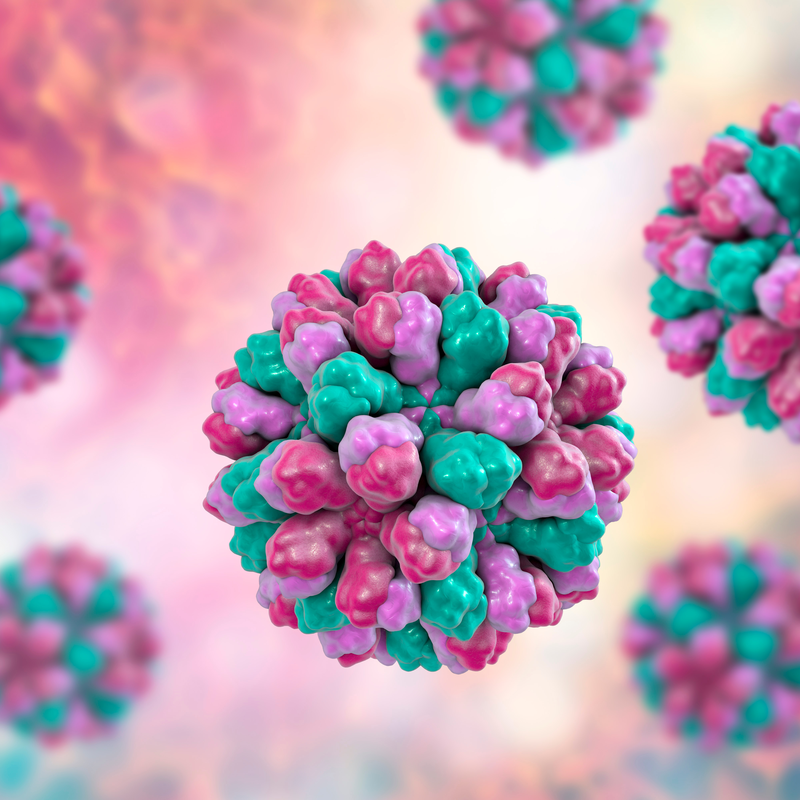
What are noroviruses?
Noroviruses can be found all over the world and everywhere. This virus is very resistant to adverse environmental influences and can even survive and be contagious on refrigerated food as well as on surfaces such as water taps, stair railings, toilet seats and door handles. The virus can even survive heat of up to 60 degrees for a few minutes.
The noroviruses are mainly the cause of acute gastrointestinal illnesses that result in diarrhoea and violent vomiting . In principle, an infection exists all year round, because there is no seasonal peak. According to the Robert Koch Institute , the norovirus is responsible for the majority of gastrointestinal illnesses that are not caused by bacteria.
How are noroviruses transmitted?
Noroviruses are highly contagious. Even a small amount of about 10 to 100 virus particles is enough to infect a person. Even few infected people can be enough to cause an epidemic. Noroviruses are transmitted from person to person. The stool or also the vomit of an affected person contains a lot of virus particles. Even tiny remnants of these excretions are therefore enough to be passed on . This happens not only during handshaking, when the still healthy person unconsciously touches his nose or mouth, but also through smear infections. If a still healthy person touches contaminated door handles, handrails or uses the crockery and cutlery of an infected person, the noroviruses are transmitted. Even in liquids or on food, the virus has no problem surviving . Because of this, there have been repeated locally triggered epidemics in the past, for example in canteens and dining halls.
It is not possible to give a general incubation period, as it varies from person to person. Most people who become infected with the norovirus show the first signs already after a few hours after the infection. For others, however, one or even two days may pass before the infection breaks out. Overall, however, can be said that the average incubation period around is six to 50 hours.
Immediately after infection you are considered contagious and can therefore already pass on the virus. As soon as symptoms appear, you are particularly contagious. Even after the symptoms have subsided, a person is still considered infectious for at least 48 hours. Even 14 days after overcoming the illness, noroviruses can still be detected in the stool in individual cases. It is therefore important to maintain proper and careful hygiene throughout this time.
What are the symptoms of noroviruses?
The symptoms of a norovirus mostly appear suddenly and become noticeable with an acute gastroenteritis with gushing vomiting and violent diarrhoea. Only rarely do only one of the above-mentioned symptoms occur and this is more likely to be the case in children. In very few cases there are no symptoms of infection with the virus. The combination of vomiting and diarrhoea is also called vomiting diarrhoea and can be very dangerous, because the infected person loses a lot of fluids and electrolytes in the process. . In young children or even infants this can cause a life-threatening condition. Consequences that may occur as a result are kidney failure, circulatory problems and seizures. Usually, these symptoms persist for two to three days .
Other accompanying symptoms of norovirus may include the following:
- Nausea,
- Headache,
- Abdominal pain,
- Aching limbs,
- General feeling of illness,
- Mild fever.
How are noroviruses diagnosed?
Basically the doctor will first take a medical history and then carry out a physical examination to be able to rule out other illnesses . The focus of the examination is, of course, on the abdomen. In order to be able to detect noroviruses without a doubt, a stool sample must be examined in a laboratory for the noroviruses . If the viruses are detected in the laboratory, the laboratory director has to report this to the public health department, because according to the Infection Protection Act a report with the name of the person concerned is mandatory. This is to prevent epidemic outbreaks of the disease.
How are noroviruses treated?
There is no special therapy with medication for norovirus and is not usually necessary. It is better to try to relieve the symptoms as much as possible, i.e. to treat them symptomatically. Rest is most important during the illness. Other measures include
- drink enough fluids,
- Keep to bed rest,
- take calcium, magnesium, etc. as needed,
- take painkillers and antipyretics as needed.
- eat a light diet that is easy on the stomach.
If
during the course of the disease the condition of an affected person deteriorates to such an extent
that dehydration leads to
circulatory problems and/or seizures, treatment at
hospital becomes necessary.
What is the course of the disease with noroviruses and what is the prognosis?
Usually an infection with the virus is short but severe. As a rule, the symptoms last one to three days. If the illness runs its course without complications and the fluid and electrolyte balance remains balanced, the virus will heal without problems. For children, it is recommended that they do not go back to kindergarten or school until two to three days after the symptoms have subsided. In people who are older or have previous illnesses and are therefore weakened, the duration and severity of the symptoms are usually more severe. This is also often seen in babies. Especially if the fluid and electrolyte balance suffers severely, treatment in hospital becomes necessary. Only rarely does the norovirus lead to death.
